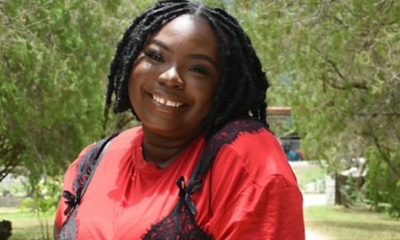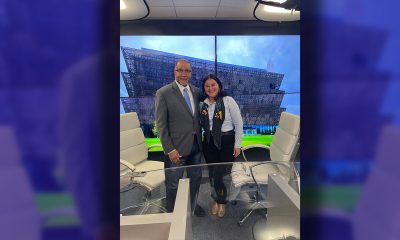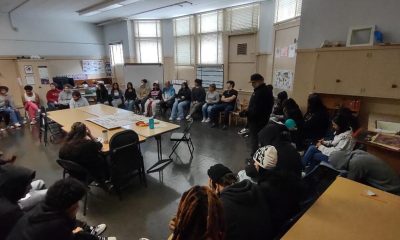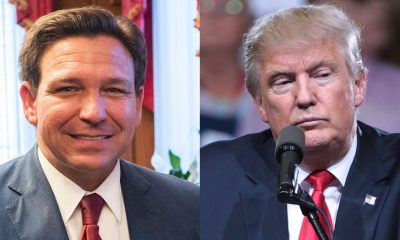World
Cuba Sees Obama Terror Promise as Healing of Historic Wound

In this Dec. 19, 2014 file photo, a U.S. and Cuban flag hang from a balcony in Old Havana, Cuba. As the two countries to end a half-century of acrimony, President Barack Obama has made clear that he is moving quickly to take Cuba off the list of state sponsors of terror, saying in a televised address on his new Cuba policy in late 2014 that “at a time when we are focused on threats from al Qaeda to ISIL, a nation that meets our conditions and renounces the use of terrorism should not face this sanction.” (AP Photo/Ramon Espinosa, File)
MICHAEL WEISSENSTEIN, Associated Press
HAVANA (AP) — A year after he took office, President Ronald Reagan placed Cuba on a list of state sponsors of terror for backing leftist guerrilla groups in Central and South America.
Cuba remained on the list as the Soviet Union fell, Fidel Castro stopped aiding insurgents and the global focus on terrorism turned to the Mideast. For outside observers, Cuba’s place on the list was a Cold War relic that showed the power of the communist government’s enemies in Congress. For Cuba, it became the most potent symbol of what many here call five decades of bullying by the superpower to the north.
Now, as the two countries move to end a half-century of acrimony, President Barack Obama has made clear that he will take Cuba off the terror list, saying in a televised address on his new Cuba policy late last year that “at a time when we are focused on threats from al Qaeda to ISIL, a nation that meets our conditions and renounces the use of terrorism should not face this sanction.”
Cuba’s top diplomat for U.S. affairs heads to Washington next week for a second round of talks on restoring ties. Cubans ranging from President Raul Castro to ordinary citizens describe their country’s removal from the list as one of the most important elements of that detente, one that could help heal a great injustice. In Cuban eyes, they are the victims of terror, not the U.S.
For Cubans, the worst act of aggression against the island since its 1959 revolution occurred when 73 people aboard a Cuban passenger flight from Barbados to Havana died in a 1976 bombing blamed on exiles with ties to U.S.-backed anti-Castro groups. Both of the men accused of masterminding the crime took shelter in Florida, where one, Luis Posada Carriles, lives quietly to this day.
“This is a small country and everybody knows somebody who knows someone who was on that plane,” said Juan Carlos Cremata, a film and theater director who was 13 when his father, a 41-year-old airline dispatcher, was killed in what Cubans call “the Crime of Barbados.”
“The U.S. is going to show that it’s an intelligent country because the most absurd, the most stupid thing in the world, is to put Cuba on a list of terrorist nations,” Cremata said.
Removal from the U.S. list could provide Cuba protection against lawsuits inside the United States because inclusion on it strips countries of important immunities that U.S. courts normally grant to foreign governments.
With Cuba and the U.S. moving to tighten trade ties, protecting Cuba and any U.S. corporate partners from lawsuits by people claiming to have been harmed by the Castro government could prove essential.
“From the Cuban point of view, resolving this problem of the list also resolves this type of concern,” said Jesus Arboleya, an international relations professor at the University of Havana who served as Cuban consul in Washington from 1979 to 1982. “It isn’t convenient for anyone that they call Cuba a state sponsor of terrorism.”
While removal from the terror list would have no direct impact on U.S. sanctions against Cuba, it could also make it easier for international banks to justify doing business with Cuba, said Robert L. Muse, an attorney specializing in U.S. laws on Cuba.
The bank that handled transactions for Cuba’s interests section in the U.S. closed its account last year, leaving its diplomats dealing almost exclusively in cash. The ability to reopen a U.S. bank account is one of Cuba’s most urgent demands in the negotiations to reopen embassies. While that decision falls to individual banks, removal from the terror list will make it easier.
“Its continuing presence on the list harms U.S. national interests because it prevents a rapprochement,” Muse said. “Cuba should be taken off the list because it doesn’t belong.”
The other countries on the list are Iran, Sudan and Syria. Removing Cuba requires Obama to send Congress a report certifying that the island hasn’t supported international terrorism for the past six months. Forty-five days later, Cuba will be taken off unless the House and Senate pass a joint resolution to block the move. Such a resolution appears highly unlikely, although Cuban-American legislators in Congress remain vehemently opposed to taking Cuba off the list because they say Havana’s behavior hasn’t changed, even if circumstances have.
“Cuba continues to harbor members of foreign terrorist organizations as well as fugitives from US justice who are responsible for the deaths of Americans,” said Brooke Sammon, a spokeswoman for Florida Republican Sen. Marco Rubio. “Senator Rubio has seen no indication that the Castro regime has fundamentally changed its behavior and is deserving of being removed from the list.”
Recent State Department reports on the list mention Cuba’s sheltering members of the Marxist guerrila group the Revolutionary Armed Forces of Colombia, or FARC, and the Spanish Basque separatist group ETA. They make little pretense that the U.S. actually considers Cuba to be a state sponsor of terror.
“There was no indication that the Cuban government provided weapons or paramilitary training to terrorist groups,” the State Department said in 2013.
Cuba is sponsoring ongoing peace talks between the FARC and the Colombian government in Havana. And Spain’s interest in members of the Basque group living abroad has dwindled considerably in the last decade, given a definitive ETA cease-fire in 2011 and the rising threat posed by Islamist radicals.
The biggest potential problem for Cuba is posed by black and Puerto Rican militants who fled there after carrying out attacks in the United States. The fugitives include Joanne Chesimard, who changed her name to Assata Shakur and was granted asylum by Fidel Castro after she escaped from the prison where she was serving a sentence for killing a New Jersey state trooper in 1973.
Cuba has made clear that it has no intention of returning Chesimard, particularly since the man it accuses of orchestrating the “Crime of Barbados,” Posada Carriles, has been living in Miami since a Texas federal jury in 2011 acquitted him of lying to U.S. officials about his role in a string of 1997 Havana hotel bombings that killed an Italian tourist. The U.S. government has refused to turn him over for trial in the Cubana bombing.
While few Cubans expect the U.S. to extradite Posada Carriles, many call removing Cuba from the terror list a welcome measure nonetheless.
“It would be an extraordinary event for me, for my family and I think for all the relatives of the victims,” said Camilo Rojo, a lawyer who was 5 when his father, an airline security guard, died on the flight.
____
Anne-Marie Garcia in Havana, Ciaran Giles in Madrid and Curt Anderson in Miami contributed to this report.
____
Michael Weissenstein on Twitter: https://twitter.com/mweissenstein
Copyright 2015 The Associated Press. All rights reserved. This material may not be published, broadcast, rewritten or redistributed.
Activism
African Union Group to Award Rev. Dr. Amos Brown for Bringing Civil Rights Movement to Global Stage
Dr. Macaulay Kalu, secretary general of AU6RG, will present Dr. Brown with the Global Peace Builder Award. Other presenters include Rev. Dr. Freddie Haynes, senior pastor of Friendship West Baptist Church in Dallas; Oakland Mayor Barbara Lee, long-time advocate for appropriations to Africa as a congressmember; Rick Callendar, California-Hawaii president of the NAACP; Dr. Ike Neliaku, president and chairman of the Nigerian Institute of Public Relations; Pastor Ituah Ighodalo, head of the African Leadership Group and Ambassador Thompson and John William Templeton, founder of the Journal of Black Innovation National Black Business Month®.

By Carla Thomas and John William Templeton
On Aug. 31, the Third Baptist Church of San Francisco will mark its 173rd anniversary with an event steeped in history and global significance. This year’s commemoration, themed “Achieving Dr. King’s Promised Land Together,” will honor the lifelong achievements of Dr. Amos C. Brown, Sr.— a towering figure in the Civil Rights Movement — on a day that also observes the International Day for People of African Descent.
Brown will be recognized by the African Union’s organ for Africans abroad for ‘planetizing’ the civil rights movement gains at San Francisco’s Third Baptist Church, 1399 McAllister St., at 3 p.m.
The African Union, made up of 54 countries on the African continent, consists of five regions. It created a sixth region, the African Union Sixth Region Global (AU6RG), for the 400 million Africans living abroad. On Sept. 7, the second AU-Caribbean Community Summit occurs in Addis Ababa, Ethiopia.
Dr. Macaulay Kalu, secretary general of AU6RG, will present Dr. Brown with the Global Peace Builder Award. Other presenters include Rev. Dr. Freddie Haynes, senior pastor of Friendship West Baptist Church in Dallas; Oakland Mayor Barbara Lee, long-time advocate for appropriations to Africa as a congressmember; Rick Callendar, California-Hawaii president of the NAACP; Dr. Ike Neliaku, president and chairman of the Nigerian Institute of Public Relations; Pastor Ituah Ighodalo, head of the African Leadership Group and Ambassador Thompson and John William Templeton, founder of the Journal of Black Innovation National Black Business Month®.
Held during the 173rd anniversary of the church, the event called “Africa-America: Achieving Dr. King’s Promised Land Together” is a Diaspora-wide discussion led by Dr. Brown on what Martin Luther King, Jr. would say today.
Galvanized by the horrific 1955 slaying of Emmett Till, Dr. Brown’s journey in activism began in Jackson, Mississippi, where a neighbor, Medgar Evers, the NAACP’s first field secretary in that state, encouraged Brown to found the Mississippi NAACP Youth Council.
In 1956, Evers personally drove Brown to the NAACP convention in San Francisco, where Brown would first hear Dr. Martin Luther King Jr. speak. Brown became a prominent Freedom Rider, later attending Morehouse College and taking the only class Dr. King ever taught there. Thirteen years after Evers was assassinated in Jackson, Brown arrived at Third Baptist Church in 1976, serving with distinction for 49 years before his recent retirement. Under his stewardship, the church solidified its commitment to social justice and international unity.
His Excellency Rev. Ladi Peter Thompson, deputy secretary general for peace and security of AU6RG, said, “As a mentee of Medgar Evers, Freedom Rider and student of Dr. Martin Luther King Jr., Dr. Brown is the perfect authority for the young people of the Diaspora on achieving the prophetic goal that Dr. King foresaw in Memphis.”
Lady Dentaa Amoateng, founder of Grow, Unite, Build Africa (GUBA), will also announce that Dr. Brown is an honoree at the GUBA Award in Bridgetown, Barbados in November. The popular actress in Ghana and the United Kingdom will attend in person.
Dr. Lezli Baskerville, president/counsel of the National Association for Equal Opportunity in Higher Education, which includes 105 Historically Black Colleges and Universities (HBCUs) and 90 predominantly Black institutions (PBIs), invites its students, faculty, and alumni to attend or join remotely.
“HBCUs produced both Dr. King and Dr. Kwame Nkrumah and are the fountainhead for Diaspora unity,” said Baskerville.
Templeton, author of “ReUNION: State of Black Business, 22d edition,” said “Our movement will advocate the continuance of tariff-free treatment for Africa and the Caribbean; respect for African-American and African elected officials and the 13th, 14th, and 15th Amendments and the strengthening of educational and research connections across the Diaspora.”
Templeton said Black institutions have been at the forefront of defining the image of 1.5 billion Black people globally, a mission that is even more important as African youth will be the majority of the world’s young people in the coming decades.
ABOUT THIRD BAPTIST CHURCH
Founded on West Indian Emancipation Day on Aug.1, 1852, Third Baptist said in its annual report in 1858 that its sole purpose was the elimination of American chattel slavery and took an active role among the California abolitionists who convinced President Abraham Lincoln to issue the Emancipation Proclamation. The current sanctuary is constructed with wood from the Goodall Mansion, where President U.S. Grant stayed after leaving the White House, and is the last place where Dr. W.E.B. DuBois spoke before leaving for Africa in 1958.
Activism
Newsom, Pelosi Welcome Election of First American Pope; Call for Unity and Compassion
“In his first address, he reminded us that God loves each and every person,” said Newsom. “We trust that he will shepherd us through the best of the Church’s teachings: to respect human dignity, care for the poor, and wish for the common good of us all.” Newsom also expressed hope that the pontiff’s leadership would serve as a unifying force in a time of global instability.
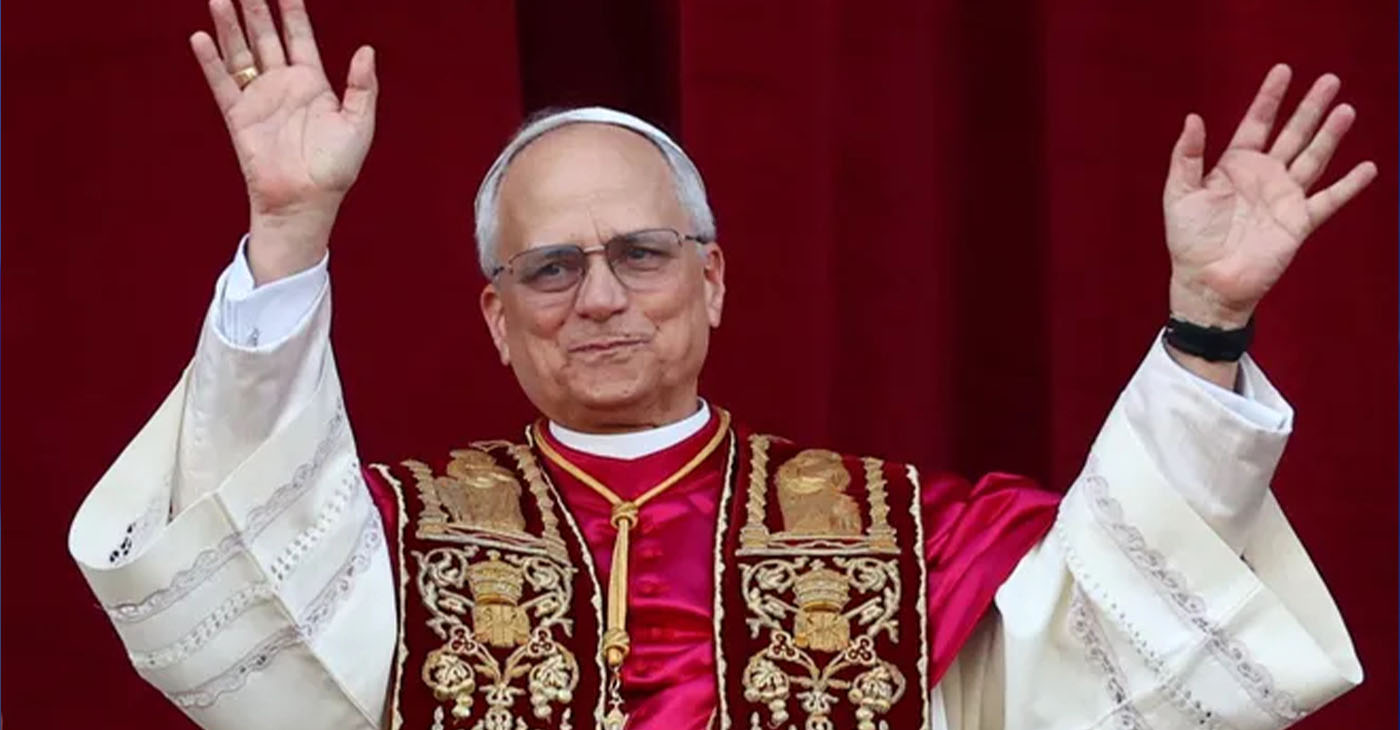
By Bo Tefu, California Black Media
Gov. Gavin Newsom and First Partner Jennifer Siebel Newsom on May 8 issued a statement congratulating Pope Leo XIV on his historic election as the first American to lead the Catholic Church.
The announcement has drawn widespread reaction from U.S. leaders, including former House Speaker Nancy Pelosi, who called the moment spiritually significant and aligned with the values of service and social justice.
In their statement, the Newsoms expressed hope that the newly elected pope would guide the Church with a focus on compassion, dignity, and care for the most vulnerable. Newsom said he and the First Partner joined others around the world in celebrating the milestone and were encouraged by the pope’s first message.
“In his first address, he reminded us that God loves each and every person,” said Newsom. “We trust that he will shepherd us through the best of the Church’s teachings: to respect human dignity, care for the poor, and wish for the common good of us all.”
Newsom also expressed hope that the pontiff’s leadership would serve as a unifying force in a time of global instability.
“May he remind us that our better angels are not far away — they’re always within us, waiting to be heard,” he said.
Pelosi, a devout Catholic, also welcomed the pope’s election and noted his symbolic connection to earlier church leaders who championed workers’ rights and social equality.
“It is heartening that His Holiness continued the blessing that Pope Francis gave on Easter Sunday: ‘God loves everyone. Evil will not prevail,’” said Pelosi.
Activism
Retired Bay Area Journalist Finds Success in Paris with Black History Tours
In the late 90s, Stevenson finally realized her dream of living in Paris, now with her daughter. She started exploring the history of Africans in the city and would go on to teach others the same. Her business, which she named Black Paris Tours (BPT), received a significant boost when a family friend gave her a stack of cash and encouraged her to expand on the knowledge that she had only started to share with people she knew.

By Post Staff
There were two things Oakland-born, East Palo Alto-raised Ricki Stevenson always dreamed of:
- Going to New York as a newscaster to tell the true story of Blacks in America.
- Living and working in Paris one day.
Her dreams of life in Paris began when she was three years old and her mother, a former professional dancer, took her to see Josephine Baker perform. She was 11 when her parents took her to the Stanford University campus to meet James Baldwin, who was speaking about his book, “The Fire Next Time.” Ricki says that’s when she knew she’d one day live in Paris, “the city of light!”
But before that would ever happen, she had a tumultuous career as a newscaster across the country that was inspired by her family’s history.
Stevenson recalls marching with Cesar Chavez as he fought for labor rights for farm workers in California.
“Are we Mexican too?” she asked her parents. “No, but we will fight for everyone’s human rights,” they responded to her.
Ironically, Ricki’s paternal family roots went back to Greenwood, Oklahoma, infamous for the 1921 bombing of Black Wall Street. A time when Black people had oil wells, banks, and a thriving business community.
This background would propel her into a 25-year journalism career that gave her the opportunity to interview greats like President Jimmy Carter, PLO leader Yassir Arafat, James Baldwin, Rev. Jesse Jackson, UN Ambassador Andrew Young, Miriam Makeba, and the leaders of South African liberation movements.
A job offer from KCBS radio brought her back to the Bay Area in the 1980s. Then came the switch to TV when she was hired as a Silicon Valley business reporter with KSTS TV, working at the first Black-owned television station in northern CA (created and owned by John Douglas). Along the way, Stevenson worked as an entertainment reporter with BET; coproduced, with her disc jockey brother Isaac, a Bay Area show called “Magic Number Video;” lived in Saudi Arabia; worked as an international travel reporter with News Travel Network; and worked at KRON TV a news anchor and talk show host.
In 1997, Stevenson realized her dream of living in Paris with her young daughter, Dedie. She started exploring the history of Africans in the city and would go on to teach others the same. Her business, which she named Black Paris Tours (BPT), received a significant boost when a family friend, Admiral Robert Toney put a chunk of money in her hand. He said, “Ricki, my wife and I have been coming to Paris for 20 years, but in just two days with you and Dedie, we’ve learned and seen more than we ever did before.”
Years after BPT took off, Ricki met Nawo Carol Crawford and Miguel Overton Guerra, who she recruited as senior scholar guides for Black Paris Tours.
Guerra says he is proud of his work with Black Paris Tours in that it provides a wealth of information about the rich legacy of African and African American history and influence in Paris and Europe.
“I tend to have a feeling for history always being a means of a reference point backwards … you start to understand the history, that it isn’t just the United States, that it began with African people,” Guerra says.
He said that it’s been a pleasure to watch people learn something they didn’t know before and to take them through the city to key points in Black history, like hangout spots for writers like Baldwin and Richard Wright, restaurants in the busiest parts of Paris, the home of Josephine Baker and so much more.
Although the tours are open to all, Guerra hopes that those of African descent from all over the world can embrace that they don’t have to just stay where they are because movies and media have portrayed cities like Paris to be only white, it’s multicultural and accepting to all.
“We’ve been here, and we’ve been there, going way back when. And we shouldn’t be considered or consider ourselves to be strangers in any place that we go to,” he said.
Stevenson notes they’ve had 150,000 people take their tour over the years, with notables like former NFL quarterback Colin Kaepernick, Smokey Robinson, Steve Harvey, Miriam Makeba, and more.
Friends and former media colleagues of Stevenson compliment the BPT crew on their knowledge of the city and their ability to always keep it interesting.
“He [Guerra] just had a deep, deep wealth of knowledge and he was constantly supplanting information with historical facts and the like. I love that it was demonstrating and showing how Black people have thrived in Paris or contributed to the culture in Paris,” Candice Francis said.
She toured in the summer of 2022 and stated that in the two weeks that they visited Paris, BPT was the highlight of her trip. She shared that she was proud of Stevenson and the life she’d managed to manifest and build for herself.
“Even if you’re visiting Paris for the tenth time, if you haven’t taken the tour, then by all means, take it,” Francis emphasized.
Magaly Muñoz, Gay Plair and Paul Cobb also contributed to this story. You can book your own adventure with Black Paris Tours at www.blackparistour.com.
-

 Alameda County4 weeks ago
Alameda County4 weeks agoSeth Curry Makes Impressive Debut with the Golden State Warriors
-

 Bay Area3 weeks ago
Bay Area3 weeks agoPost Salon to Discuss Proposal to Bring Costco to Oakland Community meeting to be held at City Hall, Thursday, Dec. 18
-

 Activism3 weeks ago
Activism3 weeks agoMayor Lee, City Leaders Announce $334 Million Bond Sale for Affordable Housing, Roads, Park Renovations, Libraries and Senior Centers
-

 Activism3 weeks ago
Activism3 weeks agoOakland Post: Week of December 10 – 16, 2025
-

 Arts and Culture3 weeks ago
Arts and Culture3 weeks agoFayeth Gardens Holds 3rd Annual Kwanzaa Celebration at Hayward City Hall on Dec. 28
-

 Activism3 weeks ago
Activism3 weeks agoOakland School Board Grapples with Potential $100 Million Shortfall Next Year
-

 Activism3 weeks ago
Activism3 weeks ago2025 in Review: Seven Questions for Black Women’s Think Tank Founder Kellie Todd Griffin
-

 Advice3 weeks ago
Advice3 weeks agoCOMMENTARY: If You Don’t Want Your ‘Black Card’ Revoked, Watch What You Bring to Holiday Dinners

